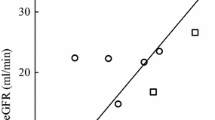Abstract
Objective: To study the effect of cisplatin on plasma concentrations and urinary excretion of carnitine in ten patients with different malignancies treated with chemotherapy.
Methods: Carnitine concentrations were determined using a radioenzymatic assay and other metabolites by routine methods of clinical chemistry. Renal clearances were calculated by dividing urinary excretions by the respective plasma concentrations.
Results: Before treatment, all patients had a normal plasma carnitine concentration. During treatment with cisplatin, the plasma total carnitine concentration increased by approximately 30% and normalized 7 days after stopping therapy. Urinary excretion of total carnitine increased by a factor of 10 during cisplatin administration and also normalized 7 days after cessation of chemotherapy. This increase was due to excretion of both free carnitine and acylcarnitine and averaged approximately 1 mmol carnitine per day. Similarly, urinary clearance of total carnitine was increased during therapy with cisplatin by a factor of approximately 8 and returned to normal 7 days after chemotherapy. In comparison, patients with similar malignancies treated with radiotherapy showed no significant increase in renal carnitine excretion. Similar to urinary excretion of carnitine, excretion of glucose and phosphate, two metabolites also reabsorbed by the proximal tubule of the nephron, was increased during therapy with cisplatin. There was a strong linear correlation between urinary excretion of free carnitine and acylcarnitines.
Conclusions: Treatment with cisplatin is associated with a tenfold increase in renal carnitine excretion, most likely due to inhibition of carnitine reabsorption by the proximal tubule of the nephron. Well-nourished patients support this loss of carnitine even after repeated cycles of chemotherapy without developing hypocarnitinaemia. However, cachectic patients with decreased dietary carnitine uptake may develop carnitine deficiency when treated repeatedly with chemotherapies including cisplatin.
Similar content being viewed by others

Author information
Authors and Affiliations
Additional information
Received: 26 November 1997 / Accepted in revised form: 25 May 1998
Rights and permissions
About this article
Cite this article
Heuberger, W., Berardi, S., Jacky, E. et al. Increased urinary excretion of carnitine in patients treated with cisplatin. E J Clin Pharmacol 54, 503–508 (1998). https://doi.org/10.1007/s002280050504
Issue Date:
DOI: https://doi.org/10.1007/s002280050504



